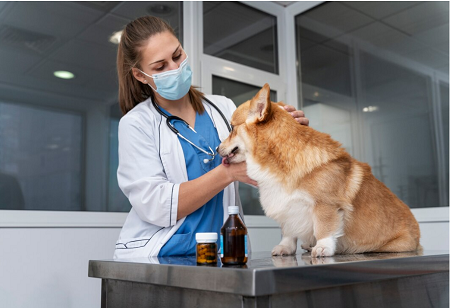Hridkamal Roy, Assistant Managing Editor, India Pharma Outlook

It has been observed that popular animal health companies including the likes of DSM-Firmenich are collecting thousands of data points on livestock and poultry for the purpose of monitoring animal health and performance, and to detect and predict challenges to address them earlier. AI systems are analyzing the acquired data to help producers make the right decisions for their operations and create personalized medications that address the required pain points. In this regard, Big Data has become the buzzword for the animal health industry. With advancing data analytics tools and machinery, organizations are able to perform accurate analysis and gain new insights about diseases. It has immensely facilitated monitoring, control and treatment more effectively than ever.
“We’re moving into an era where data complexity and volume could be simultaneously the biggest opportunity we have in our sector, and also the biggest challenge that we have. We’re basically taking biomarkers and animal metadata, performance data, mortality figures, health status and so on, and creating models that will use the biomarkers to predict disease occurrences and prevalence and severity,” Aaron Cowieson, Head of Digital Consultancy and Solutions, DSM-Firmenich.
Several aspects need consideration when it comes to data analytics transforming the production of personalized medicines for animals. It is not only the enhanced production accuracy that comes under the radar, but also the data driven processes that are accelerating diagnosis and treatment have also made significant impact in discovery of new drugs.
The approach of precision medicine is designed for healthcare customization, with treatments being specifically designed to match the distinct genetic makeup, habits, and environmental exposures of each patient. Healthcare entities leverage the power of data management and analysis to uncover trends, markers, and genetic factors that play a role in the likelihood and treatment efficacy of diseases. Gaining these insights is paving the way for creation of specialized treatments and measures that not only enhance the effectiveness of care but also diminishes the likelihood of negative side effects. By incorporation of detailed patient data right from genetic profiles to clinical histories and even real-time health monitoring healthcare providers can formulate treatment processes that are as unique as the patients themselves.
In this regard, a company that manufactures precision medicine through data analytics is Boehringer Ingelheim Animal Health. It utilizes advanced data analytics to develop tailored treatments and vaccines for various animal species, enhancing the precision and effectiveness of their medical solutions.
“With support from the UF strategic funding initiative, a state-of-the-art, AI-enabled digital imaging platform will be developed to collect, collate, and analyze patient data. This innovative, first-of-its-kind veterinary learning health care system will create a path for the development of precision medicine — medical solutions customized to each patient with the aid of molecular and genomic data sets”, mentioned Saray Carey, Director of Communications, University of Florida College of Veterinary Medicine.
The landscape of veterinary pharmaceutical manufacturing is undergoing a revolution by the application of data analytics. By examining various production metrics such as batch records, quality control assessments, and supply chain details, businesses in this sector are able to bring refinement in their manufacturing methodologies. They are also being able to elevate the caliber of their products and maintain adherence to regulatory standards. By making use of data in order to guide strategic decisions, manufacturers are able to pinpoint opportunities to enhance processes, bring cost effectiveness in production, and improve the overall efficiency of supply chain management process. Furthermore, the analysis of data facilitates the detection of patterns in reports of adverse events, which contributes to the ongoing enhancement of product quality and safety.
To give an example, a notable animal health company that uses data-driven insights for pharmaceutical production is Zoetis. It employs advanced data analytics and technology to enhance the development and manufacturing of veterinary medicines and vaccines.
“All of the metadata is connected. And, for each data point, there are hundreds of branches or variables. This is where bioinformatics plays a crucial role – it’s all about arithmetic – when I change this little thing here, how does that lead to this whole butterfly effect? Without those links, if you’re just looking at the body weight gain, feed conversion ratio (FCR), mortality … you’re seeing it, but you probably don’t know why that’s happening”, mentioned Raj Murugesan, Head of Global Poultry, DSM-Firmenich.
Through the strategic application of data analytics, companies specializing in veterinary drugs have significantly improved their production operations. The examination of batch records, quality control evaluations, and supply chain operations has enabled the identification and resolution of critical bottlenecks. Moreover, this has also led to reduced amount of production halts and increase in overall productivity. The benefits of data analytics in manufacturing optimization is manifold that includes cost reductions, enhancements in the quality of pharmaceutical products, and a more expedited introduction of new treatments to the market.
In this regard, an animal health company that uses data analytics for manufacturing optimization is Elanco Animal Health. The organization leverages advanced data analytics to improve manufacturing processes, ensuring efficiency and high-quality production of veterinary products.
"Incorporating data analytics into our manufacturing operations has been a game-changer. It helps us predict and mitigate issues before they arise, ensuring a consistent supply of top-quality animal health medicines", mentioned Sebastian Guth, President, Bayer US.
The future of personalized medicine in veterinary care looks bright as data technologies continues to advance. Developments in artificial intelligence and machine learning are expected to further enhance data analysis capabilities, leading to even more precise and effective treatments. Additionally, as the cost of genomic sequencing decreases, more animals will benefit from personalized care.